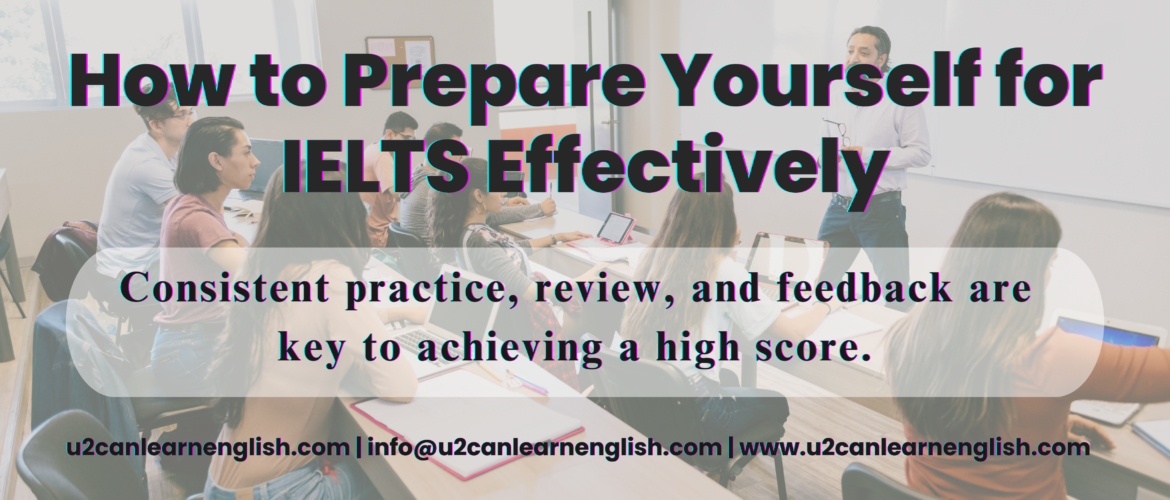How to Prepare Yourself for IELTS Effectively
- August 24, 2024
- Posted by: u2canlearnenglish
- Category: Academic English English for Competitive Exams English Language & Grammar English Literature (BA & MA in NU) IELTS & TOEFL
No Comments

Preparing for the IELTS (International English Language Testing System) requires a strategic approach to ensure you achieve the score you need. Here’s a step-by-step guide to help you prepare effectively:
- Understand the Test Format
- Sections: The IELTS has four sections—Listening, Reading, Writing, and Speaking.
- Types: Decide whether you need the Academic or General Training version.
- Timing: Familiarize yourself with the time limits for each section.
- Scoring: Understand the band scores and how they relate to your goals.
- Assess Your Current Level
Take a practice test to identify your strengths and weaknesses. This will help you focus on areas that need improvement.
- Create a Study Plan
- Set a Timeline: Decide how long you need to study based on your current level and target score.
- Daily Goals: Dedicate specific time each day to each section of the test.
- Practice Regularly: Consistent practice is key. Include timed practice tests to simulate exam conditions.
- Focus on Each Section
Listening:
- Practice listening to different accents (British, Australian, American, etc.).
- Work on understanding spoken English in various contexts (lectures, conversations, etc.).
Reading:
- Practice skimming and scanning techniques to quickly find information.
- Read a variety of materials like newspapers, journals, and online articles.
Writing:
- Focus on both Task 1 and Task 2. For Academic IELTS, Task 1 involves describing a graph, chart, or diagram, while General Training involves writing a letter.
- Task 2 is an essay for both types. Practice organizing your thoughts, using clear arguments, and managing your time.
Speaking:
- Practice speaking English every day. Record yourself and evaluate your fluency, coherence, and pronunciation.
- Simulate the speaking test by answering practice questions.
- Use Official IELTS Practice Materials
- Use materials provided by the British Council, IDP, or Cambridge IELTS for practice. These are closest to the actual test format.
- Expand Your Vocabulary
- Learn new words daily, focusing on academic and general English vocabulary.
- Practice using these words in context, especially in writing and speaking.
- Develop Test-Taking Strategies
- Time Management: Practice completing each section within the time limits.
- Answering Techniques: Learn strategies like eliminating wrong answers, guessing intelligently, and writing concisely in the writing section.
- Stress Management: Practice relaxation techniques to stay calm during the test.
- Take Mock Tests
- Regularly take full-length mock tests under timed conditions. This helps build stamina and gives you a realistic sense of the test environment.
- Review and Improve
- After each practice test, review your mistakes and understand why you made them.
- Focus on improving weak areas identified in practice tests.
- Consider Joining a Preparation Course
- If you need structured guidance, consider enrolling in an IELTS preparation course. Many online and in-person options are available.
- Stay Consistent and Motivated
- Keep a positive attitude and stay motivated throughout your preparation. Regular progress tracking can help maintain your focus.
- Get Feedback
- If possible, get feedback from an experienced teacher or someone proficient in English, especially for the writing and speaking sections.
By following these steps, you’ll be well on your way to achieving a good score on the IELTS.
